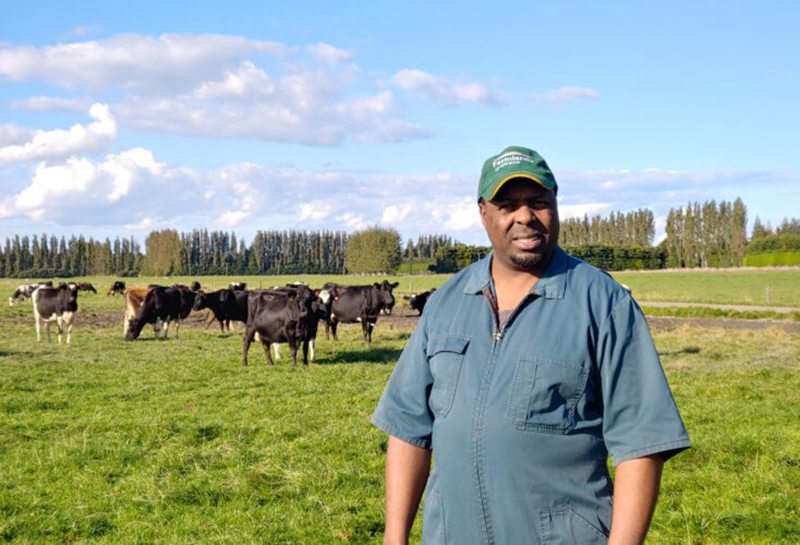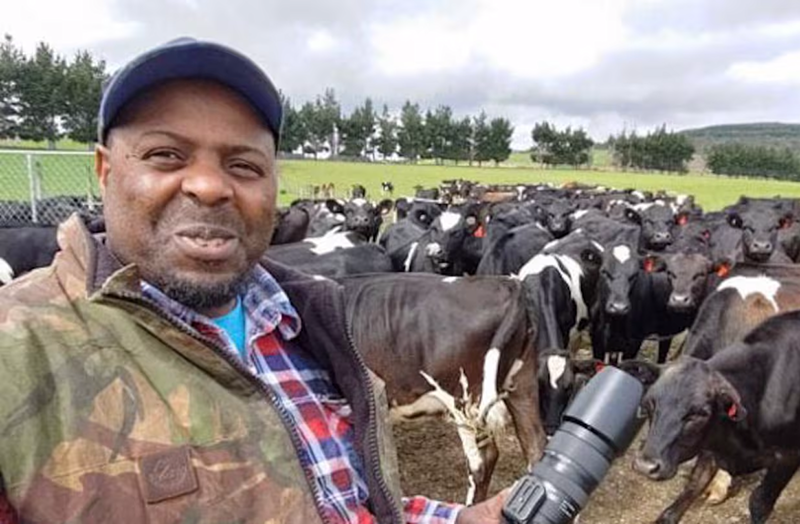- Diaspora
- No Comment
Farming in New Zealand is easy: Zimbabwean Maponga into beef and mushroom production

“I came to Wellington and I was looking for a farming job. My first interview I had was for a shepherding job at a sheep station. They said ‘Have you got your own dogs?’ I said ‘Well, I just got off the plane.’”
OTAUTAU: Keep it to yourselves, but farming in New Zealand is relatively easy.
When you compare it to Edwin Mabonga’s farming escapades in his native Zimbabwe – often contending with leopards, snakes and countless diseases – it almost certainly is.
Mabonga moved to New Zealand in 2002 and is now a farm owner in Southland’s Otautau.
After sharemilking for 13 years in the north and south he’s turned to fungi, growing oyster mushrooms.
The 52-year-old has taken a hard road to get where he is today. Looking back on the move he took over a decade ago, he is grateful for what Aotearoa New Zealand and its farming community have given him and his family.
“I came to Wellington and I was looking for a farming job. My first interview I had was for a shepherding job at a sheep station. They said ‘Have you got your own dogs?’ I said ‘Well, I just got off the plane.’”
After spending a lifetime farming flowers and beef cattle in Zimbabwe, Mabonga learnt quickly how to place a set of cups on a cow’s udder and made a career in dairy farming.
Starting in Taranaki, he shifted to another farming capital – Riversdale, Southland.
Today, Mabonga has never been happier, nor felt more welcomed by the local community.
“It has definitely been a better lifestyle for us, it has been good for us. Everyone has given me a fair go at life here.”
Mabonga uplifted his family from the Mashonaland region in central Zimbabwe because of the unfolding political situation of the early 2000s.
“The whole country was affected by the toxic politics one way or another.”
Zimbabwe had been experiencing political and economic upheaval since 1999, a period that included farm seizures and worsening economic and human rights conditions.
“We came here for a better life, really.”
Farming in Zimbabwe had challenges that far surpass the tightened government regulations seen in New Zealand over the past decade, so look away when Mabonga says that “farming in New Zealand is easy”.

“I know it is difficult because of the exterior rules, in fact the rules are the hardest part of farming in New Zealand and they are man-made. Perhaps because farming is easy in New Zealand, someone with the rule books decided let’s make it difficult,” he said.
Mabonga isn’t dismissing the challenges farming here faces, such as the natural disasters experienced around the country, particularly in the South Island’s West Coast and on the North Island’s east coast.
He also understands government climate change initiatives and rules can take some of the joy out of farming. The cost of regulations plus production is often only just covered. These stresses exist, he said.
But “it is always going to rain and so grass is going to grow”.
“You don’t have half the diseases that we have there; you don’t have foot and mouth, you don’t have anthrax, you don’t have black leg, all these tropical diseases.
“You don’t have ticks and all the tick-borne diseases that come with that, you don’t have lions and you don’t have snakes. I could go on and on. Where we were farming there were leopards.”
It was not uncommon for leopards to kill calves, nor was it rare for the black mamba, green mamba or brown cobra snakes to kill cows on their farm.
“Snakes are a big problem. The snakes would ‘suck milk’ off the cow, straight from the teat.
While snakes are physically incapable of drinking milk from a cow’s udder, if dehydrated, the reptile will be attracted to any source of liquid. If the cow is alarmed by the snake’s presence, the reptile usually defends itself by biting the cow.
“The wastage would be if the cow would kick, then the snake would bite it and then you would find a dead cow.”
In Zimbabwe it’s a legal requirement for farmers to own guns to safely protect their stock from these lethal animals.
“I have shot a lot of snakes just to protect ourselves.
“And then there is theft. You talk about ram raiders in Auckland; in Zimbabwe you had to protect your property.”
Mabonga’s house, farm and sheds were protected with a deer-high fence with barbed wire to keep the daily threat of intruders.
“They’d help themselves; security was an issue.”
Looking back on the high-stress environment farming was back home, Mabonga keeps a sense of humour about it.
“I am now scared of snakes. I look back and I wonder how I survived. I am so used to the lifestyle here, it now scares me what I saw. I would be running now.”
Mabonga no longer has to live in fight or flight mode, owning just 200 beef cows at a time and growing mushrooms on 28 hectares.
The new lifestyle is a lot slower paced than sharemilking on the 400ha he was used to as well.
He’s running a small domestic operation producing 1.5kg of organic oyster mushrooms every second day. The mushrooms sell for $60 a kilo.
“This is a long experiment we are doing. We are trying to get into the restaurants in Queenstown. It is hard to get into that market.”
His interest in mushrooms was spawned during his horticulture diploma, when he specialised in fungi.
Mabonga arms himself with a camera nowadays and has a keen eye for photography. He said the South Island is the most beautiful part of the world for his hobby.
“I always had an interest in photography, but when we moved down to the South Island, I just picked up the camera and started taking photos. It’s beautiful. It just developed from that.”
His favourite thing about this part of the world, though? The authenticity.
“There is no commercial here and no social pressure here. I look back on the move as the best of my life.”
